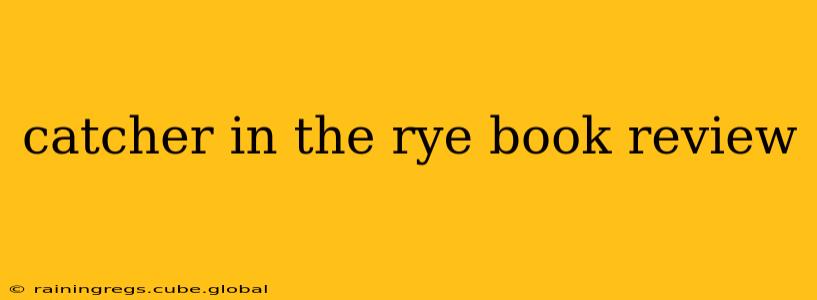J.D. Salinger's The Catcher in the Rye, first published in 1951, remains a controversial yet enduringly popular novel. Its unflinching portrayal of teenage angst, alienation, and the search for authenticity continues to resonate with readers, sparking debate and sparking critical analysis for generations. This review delves into the novel's enduring appeal, exploring its themes and literary merit while addressing some of the common criticisms leveled against it.
What is The Catcher in the Rye About?
The novel follows sixteen-year-old Holden Caulfield's experiences after being expelled from a prestigious boarding school. Narrated in Holden's distinctive, cynical, and often unreliable voice, the story unfolds as a series of encounters and reflections as he navigates New York City during a few tumultuous days. Holden's journey is characterized by his disillusionment with the "phoniness" he perceives in the adult world and his yearning for genuine connection and innocence. He grapples with grief over the loss of his younger brother Allie, struggles with his identity, and ultimately confronts his own vulnerabilities and emotional turmoil.
Why is The Catcher in the Rye Still Relevant Today?
Despite being written over 70 years ago, The Catcher in the Rye retains its relevance due to its timeless exploration of universal adolescent experiences. Holden's struggles with identity, alienation, and the pressures of societal expectations are experiences that continue to resonate deeply with young readers today. His cynical observations about the adult world, while sharp and sometimes jarring, also offer a poignant commentary on the complexities and hypocrisies of human nature. The novel's raw honesty and unflinching portrayal of mental health struggles remain strikingly contemporary.
Is The Catcher in the Rye Appropriate for Young Readers?
This is a frequently asked question, and the answer is complex. While the novel's themes of teenage angst and alienation are relatable to young readers, its language, including profanity and mature themes, makes it unsuitable for younger audiences. Parents and educators should carefully consider the maturity level of the reader before assigning or recommending the book. The novel's exploration of complex and sensitive issues can be beneficial for mature young adults, but it needs to be approached with careful consideration and potentially guided discussion.
What are the main themes of The Catcher in the Rye?
The novel explores several key themes, including:
- Alienation and Loneliness: Holden's pervasive sense of isolation and his difficulty forming meaningful connections are central to the narrative.
- The Search for Authenticity: His disdain for "phoniness" reflects a yearning for genuine human connection and a rejection of societal pressures.
- Grief and Loss: The death of his brother Allie profoundly shapes Holden's perspective and fuels his emotional turmoil.
- Identity and Self-Discovery: Holden's journey is one of self-discovery, as he grapples with his own identity and struggles to find his place in the world.
- Mental Health: Holden's experiences strongly suggest underlying mental health struggles, prompting important conversations about adolescent mental well-being.
What is the significance of the title, The Catcher in the Rye?
The title alludes to a fantasy Holden has of catching children before they fall off a cliff and into adulthood. This symbolizes his desire to protect innocence and prevent the loss of purity. The image of the "catcher" represents his longing for a simpler time and his resistance to the perceived corruption of the adult world.
What is Holden Caulfield's character like?
Holden Caulfield is a complex and deeply flawed character. He is cynical, sarcastic, and often self-destructive. However, beneath his tough exterior lies a vulnerable and sensitive individual struggling to cope with loss and the complexities of adolescence. His unreliability as a narrator adds another layer to his character, forcing readers to question his perceptions and interpretations of events.
Is The Catcher in the Rye a coming-of-age story?
Absolutely. The Catcher in the Rye is a powerful and poignant coming-of-age story that explores the challenges and uncertainties of adolescence. Holden's journey is a testament to the complexities of growing up and finding one's place in the world, even amidst emotional turmoil and uncertainty.
Conclusion
The Catcher in the Rye remains a significant and thought-provoking novel. While its controversial aspects continue to spark debate, its exploration of timeless themes of adolescence, alienation, and the search for authenticity ensures its enduring relevance. The novel's impact lies not only in its raw honesty but also in its ability to initiate crucial conversations about mental health, identity, and the complexities of the human experience. Its continued presence in classrooms and on reading lists worldwide is a testament to its lasting power and enduring influence on literature and culture.
